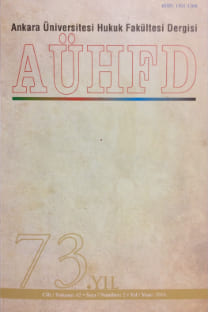DEVLETİN BİRLİĞİNİ VE ÜLKE BÜTÜNLÜĞÜNÜ BOZMAK SUÇU
5237 sayılı Türk Ceza Kanunu'nun 302. maddesinde devletin birliğini ve ülke bütünlüğünü bozma suçuna yer verilmiştir. TCK. m. 302 ile korunan hukuki değerler; devletin birliği, bağımsızlığı, egemenliği ve ülke bütünlüğüdür. Suçun faili herkes olabilir. Söz konusu suç bir kalkışma suçu olarak düzenlenmiştir. Dolayısıyla suç tipinde öngörülen neticelerden birini gerçekleştirmeye yönelik elverişli bir fiil bu suçu meydana getirir. Suçun maddi unsurunu oluşturan hareketlerden ilki devletin ülkesini oluşturan toprakların tamamını veya bir kısmını yabancı bir devletin egemenliği altına koymaktır. İkincisi devletin bağımsızlığını zayıflatmaya yönelik fiillerdir. Üçüncüsü devletin siyasi ve hukuki birliğini bozmaya yönelik fiillerdir. Dördüncüsü ise devletin egemenliği altında bulunan topraklardan bir kısmını devlet idaresinden ayırmaya yönelik hareketlerdir. Bu suç maddede açıkça öngörülmemiş olsa da Terörle Mücadele Kanunu'nun 3. maddesi tarafından terör suçu olarak sayılmış olması nedeniyle ancak cebir hareketleriyle işlenebilir. Kalkışma fiili cebir gerçekleştirilmedikçe ve anayasanın öngördüğü demokratik kurallar çerçevesinde yerine getirildikçe suç oluşturmaz. Suçun oluşması için maddede belirtilen amaçlardan birini gerçekleştirmeye yönelik fiillerin işlenmesi aranmıştır. Bu sebeple söz konusu suç ancak özel kastla işlenebilir. Hükümde öngörülen zararlı neticelerin gerçekleşmesine yönelik elverişli hareketlerin icrasına başlandığında suç tamamlanmış kabul edilir. Dolayısıyla bu suça teşebbüs mümkün değildir. Suç tek kişi tarafından işlenebileceği gibi iştirak halinde hatta genelinde örgüt faaliyeti kapsamında da işlenebilir. Hükümde öngörülen değerlerden herhangi birine veya birden fazlasına yönelik işlenen fiiller tek bir suçu oluşturur. Ancak TCK. m. 302/2'ye göre bu suçun işlenmesi sırasında başka suçların da işlenmesi halinde, ayrıca bu suçlardan dolayı ilgili hükümlere göre cezaya hükmolunur.
The Crime of the Breach of National Unity and Territorial Integrity of the State
The crime "the breach of national unity and territorial integrity" is regulated in Article 302 of Turkish Criminal Code No. 5237. In this article, legally protected values are unity, independence, sovereignty and territorial integrity of the state. The perpetrator of the crime could be anyone. This crime is regulated as an attempted crime. Therefore, only a proper act to substantiate one of the stated results is sufficient for committing the specified crime.The acts that constitute the material element of the crime consist of four different acts. First of them are the acts leads to partition of the state by allowing another state to rule a part or the whole territorial land. Second are the acts that weaken the independence of the state. Third are the acts which have an intention to disrupt legal and political unity. While the fourth are the acts directed to separate a portion of territories which are under the sovereignty of the state.Although it is not presumed in Turkish Criminal Code, this crime can only be committed by coercion because it is counted as a terror act according to Anti-Terror Law Article 3. If attempted crime is not supported with coercion and done within the ambit of the democratical rules, the crime is counted as uncommitted. To commit the crime, the acts expedient for the harmful result must be actualised. Hence this crime could only be committed with specific intent. When the expedient acts for the harmful result started, the crime is completed. Therefore attempt to this crime is not possible. This crime could be committed as an individual or in complicity, besides within an organization activity. In addition, both committing one act or more acts against the legally protected values are only counted as a single offence. However, according to Turkish Criminal Code Article 302/2, in case of committing another offence along with this act, the offender is additionally punished accordingly with the provisions relating to this offense.
___
- Bonilini G.-Confortini M., I Codici Ipertestuali Codice Penale Commentato, Mauro Ronco-Bartolomeo Romano, 4. Ediz., Utet, Torino, 2012.
- Dolcini Emilio-Marinucci Giorgio, Codice Penale Commentato, I, Ipsoa, Milano, 2006.
- Erem Faruk-Toroslu Nevzat, Türk Ceza Hukuku Özel Hükümler, Savaş, Ankara, 1983.
- Evik Vesile Sonay, "Silahlı Örgütlenme Suçu", Galatasaray Üniversitesi Hukuk Fakültesi Dergisi,2006/I.
- Fiandaca Giovanni-Musco Enzo, Diritto penale parte speciale, I.
- Hafızoğulları Zeki, "Devletin Birliğini ve Ülke Bütünlüğünü Bozmak Suçu", Prof. Dr. Nevzat Toroslu'ya Armağan, Cilt I, Ankara Üniversitesi Yayınları No: 459, Ankara, 2015.
- Lattanzi Giorgio-Lupo Ernesto, Codice penale, Rassegna di giurisprudenza e dottrina, VI, Libro II, Giuffre, 2010.
- Lattanzi Lupo, Codice penale annotato con la giurisprudenza, Giuffre, Milano, 2008.
- Maggiore, Diritto penale,Parte speciale II, 1949.
- Manzini Vincenzo, Trattato di diritto penale italiano, IV, Utet, Torino, 1987.
- Marconi, Stato (delitti contro la personalita internazionale dello), Digesto discipline penalistiche, XIII, Utet, Torino, 1997.
- Massimiliano di Pirro, Compendio di diritto penale parte generale e speciale , Celt Casa Edittrice La Tribuna, 2014.
- Özgenç İzzet, Gerekçeli Türk Ceza Kanunu, Seçkin, Ankara, 2004.
- Pannain, Personalita internazionale dello Stato (delitti contro la), Novissimo Digesta Italiana, XII, Utet, Torino, 1965.
- Parlar Ali-Hatipoğlu Muzaffer, Türk Ceza Kanunu Yorumu 2. Baskı, Seçkin, Ankara, 2008.
- Soyaslan Doğan, Ceza Hukuku Özel Hükümler, Yetkin, Ankara.2010.
- Yaşar Osman-Gökcan Hasan Tahsin-Artuç Mustafa, Yorumlu Uygulamalı Türk Ceza Kanunu, C. IV, Adalet, Ankara, 2010.
- Yenisey Feridun-Plagemann Gottfried, Alman Ceza Kanunu, Beta, İstanbul, 2009.
- ISSN: 1301-1308
- Yayın Aralığı: Yılda 4 Sayı
- Başlangıç: 1943
- Yayıncı: Ankara Üniversitesi Hukuk Fakültesi
Sayıdaki Diğer Makaleler
TÜRK CEZA HUKUKU AÇISINDAN ÖTANAZİ
Özge DEMİRÖRS, SEVİNÇ ARSLAN HIZAL
“CEZA İNFAZI MESELESİ”: BİR CEZA HUKUKÇUSU GÖZÜYLE ARA BİLANÇO
Emilio DOLCİNİ, Duygu Çağlar DOĞAN
TOPLANTI VE GÖSTERİ YÜRÜYÜŞLERİNE MÜDAHALENİN ESASLARI
İDARENİN MALİ SORUMLULUĞU AÇISINDAN ZARAR KAVRAMI
ŞİDDET SUÇLARINA GENEL BİR BAKIŞ
MEDENÎ YARGIDA İSTİNAF İLE İLGİLİ HÜKÜMLERİN ZAMAN İTİBARİYLE UYGULANMASI
YAŞAR HAKAN PEKCANITEZ, Evrim ERİŞİR
TÜRK HUKUKUNDA MARKA SUÇLARI -Sorunlu Noktalar Üzerine Bir İnceleme
FAHRİ GÖKÇEN TANER, YAPRAK ÖNTAN
BEDEN BÜTÜNLÜĞÜNÜN İHLALİNDE MANEVİ TAZMİNAT MİKTARININ BELİRLENMESİ
